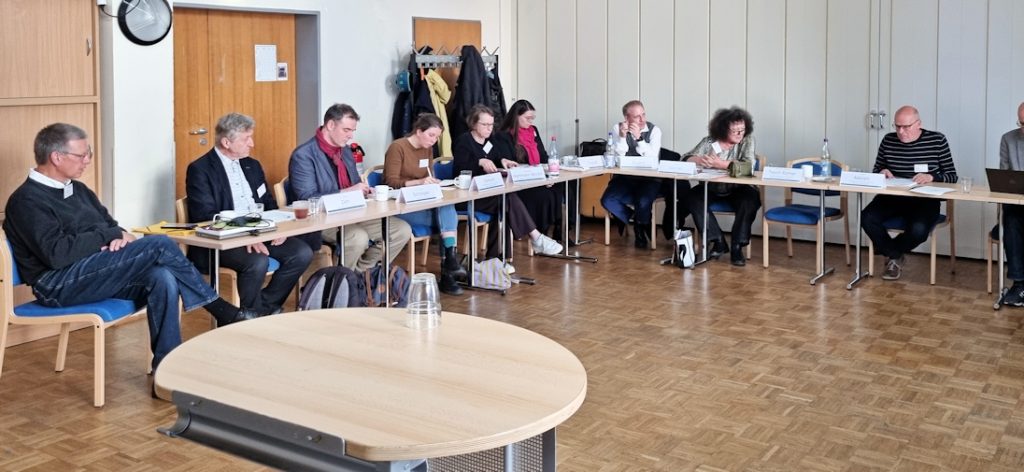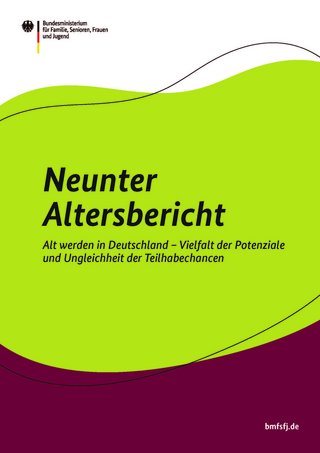During the expert discussion, we discused the findings of the Ageing Report with representatives from family organisations, welfare associations and politics. These discussions included political challenges that arise with regard to support for older people from relatives and friends.
Prof. Dr. Clemens Tesch-Römer, member of the 9th Age Report Commission, presented key content from the Report, with a particular focus on diversity, inequality and family support in old age.
The meeting was held in German.

Clemens Tesch-Römer focused his presentation on the social inclusion of older people. He emphasized that social inclusion opportunities are highly unequally distributed—depending, for example, on education, income, gender, health, migration status, or sexual identity.
He presented findings on aspects relevant to inequality, such as poverty in old age, ageism, unequal access to culture, education, political participation, and volunteer work. He said that intersectionality, i.e., the overlap of different dimensions of inequality, is particularly problematic, as it leads to serious disadvantages for those affected.
He acknowledged that families play an important role in the everyday lives of older people, for example when they themselves look after their grandchildren or receive support from family members when they need care. However, he admitted that family was not a key topic in the 9th Ageing Report.
Tesch-Römer emphasized that care work, which is often performed by women, places a considerable burden on them and requires better political framework conditions. He cited the further development of care leave regulations and a reform of elderly care as examples.
Overall, he emphazied that it is necessary to recognize social diversity, combat ageism, and align political measures in such a way that disadvantaged groups also have real opportunities for participation in old age.
Discussion
The discussion initially focused on the unequal distribution of volunteer work. It was pointed out that participation in volunteer work declines overall with age. There was particular discussion of why women are less likely to be active in volunteering. It was emphasized that this is not due to a lack of interest, but rather to structural barriers: women are more likely to take on care responsibilities in the family and for other people, which leaves them with less time and energy for voluntary work. In addition, the services and structures of many organizations are often more tailored to men, which makes it more difficult for women to participate. Using the example of people with a migration background, the question was raised as to whether existing research instruments adequately capture the actual engagement of these groups. Many migrants are involved in family or neighborhood activities, in associations or religious communities.
In this context, Prof. Tesch-Römer emphasized that the data situation is relatively good overall. Lower engagement rates among certain groups should be understood less as an expression of a lack of willingness and more as a reflection of social disadvantage. Certain population groups find it significantly more difficult to access volunteering as a resource, whether due to linguistic, organizational, or cultural barriers.
The second focus area was on family care. It was emphasized that greater political attention must be paid to this form of care work, as it forms the basis of care for people in need of care in Germany. For family caregivers, their commitment places a considerable burden on them, which has not yet been adequately alleviated by the state. On the one hand, this touches the material consequences, especially for women. They have to accept a loss of income when they take on care responsibilities and thus face an increased risk of poverty in old age in the long term. On the other hand, the inadequate design of support structures was criticized: support services are often too rigid or insufficiently available, and the landscape of counseling services for home care is confusing and difficult to access. It was also emphasized that municipal services and stronger steering at the local level urgently need to be expanded in order to ensure reliable support for families. The introduction of a financial benefit such as the planned family care allowance, which could provide better security for family caregivers, was seen as another important step.
Another point of discussion was the need to involve men more in care work. It was highlighted that only if men were to take rup esponsibility for family care, the growing demand for it can be met and the distribution of care work between the sexes be made more equitable. At the same time, however, it was pointed out that contrary tendencies are sometimes visible in public discourse: the traditional images of men promoted in the course of debates on defense capabilities pose the risk of a backlash that calls into question the trend toward greater willingness among men to engage in care work.
Finally, it was emphasized that future reports on aging should take the family perspective much more strongly into account, as family support continues to be a central element of social networks in old age.

